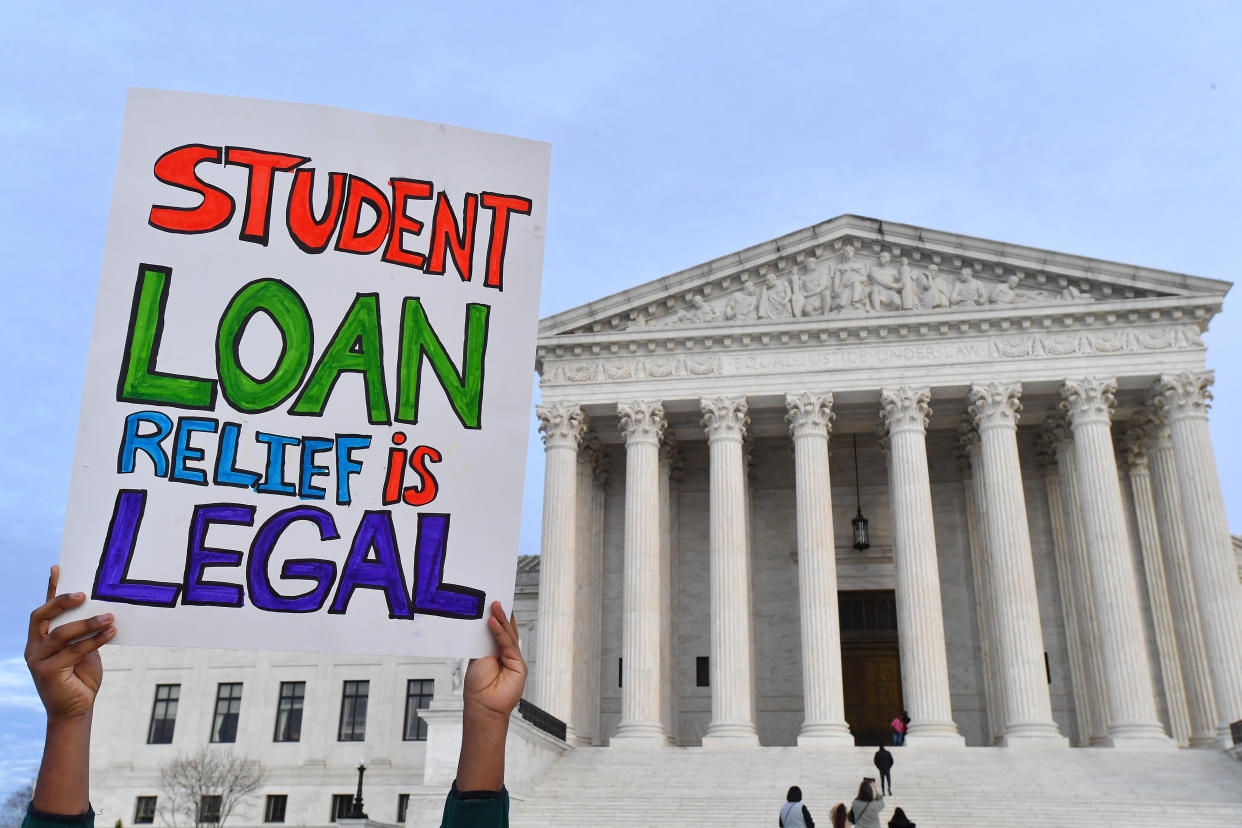Varied groups file briefs to the Supreme Court supporting Biden's student loan forgiveness
Supporters of President Biden’s plan to wipe out up to $20,000 in student loan debt for millions of Americans are urging the U.S. Supreme Court to authorize the relief.
On Wednesday, dozens of organizations and individuals, including civil rights groups, labor unions, legal experts, and state governments filed amicus briefs or “friend of the court” documents in anticipation of the court’s consideration of a set of cases — Biden v. Nebraska and Department of Education v. Brown — that will determine the legality of the relief plan.
Arguments in the two cases are scheduled before the high court on Feb. 28. A decision is expected by June. In agreeing to take up the case, the court kept in place injunctions that, for now, prevent the White House from offering the promised debt relief.
“These briefs reinforce and expand on the U.S. Department of Justice’s case that student debt relief is legal and necessary and that legal challenges brought against student debt relief lack standing,” the Student Borrower Protection Center (SBPC) said in an email on Wednesday. SBPC advocates to protect student loan borrowers.

The amicus filers counter two key arguments that the challengers — six state attorneys general and two student loan borrowers — raise in their respective cases disputing the legality of the administration’s plan.
For one, the supporters dispute the states’ and borrower's claims that the president’s executive order, which grants the U.S. Secretary of Education authority to offer COVID-19-related debt forgiveness, oversteps his executive authority. Second, the filers argue that the states and borrowers lack standing, meaning that their proposed injuries from the forgiveness plan fail to justify their participation in the dispute.
The Republican-led states — Nebraska, Missouri, Arkansas, Iowa, Kansas and South Carolina — argue that the debt forgiveness requires, yet didn't request or receive, authorization from Congress, and that their future state tax revenues would suffer shortfalls if the forgiveness is granted.
The borrowers in Brown — Myra Brown and Alexander Taylor — who are ineligible for full debt forgiveness under the relief plan argue that the Department of Education denied them an opportunity to comment on the decision to provide relief. The Supreme Court will decide if the department was authorized to issue the plan and followed proper procedures in adopting it.
Biden tapped the 2003 HEROES Act, titled the Higher Education Relief Opportunities for Students Act, to offer the debt cancellation, which was originally meant to relieve student loan debt for military members who served in Iraq and Afghanistan.
The act, the challengers contend, does not extend to offer relief tied to the COVID-19 pandemic.
U.S. Education Secretary Miguel Cardona said in a statement issued Wednesday that the amicus filings underscore the president’s authority extended to his department.
“As these diverse groups made clear today, student loan borrowers from all walks of life suffered profound financial harms during the pandemic and their continued recovery and successful repayment hinges on the Biden Administration’s student debt relief plan,” Cardona wrote. “We will continue to defend our legal authority to provide the debt relief working and middle-class families clearly need and deserve.”
The groups that filed amicus briefs in support of the administration include 70-plus legal services and borrower advocacy organizations; dozens of local governments and the cities of St. Louis, Kansas City, Little Rock; the University of Berkeley Center for Consumer Law & Economic Justice; dozens of law scholars; veterans associations; the Lawyers’ Committee for Civil Rights; Congressman George Miller who authored the HEROES Act of 2003; the American Federation of Teachers, AFSCME, and AAUP; the NAACP; and 25 economists, sociologists, public policy and higher education scholars.
Alexis Keenan is a legal reporter for Yahoo Finance. Follow Alexis on Twitter @alexiskweed.
Follow Yahoo Finance on Twitter, Facebook, Instagram, Flipboard, SmartNews, LinkedIn, YouTube, and reddit.
Find live stock market quotes and the latest business and finance news
